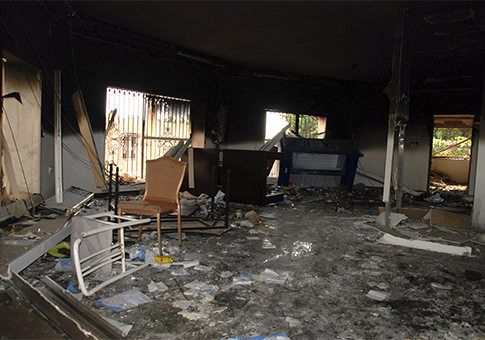State Department officials have been accused of waging an intimidation campaign against witnesses preparing to testify at a congressional hearing on the Benghazi attack, in potential violation of whistle-blower protection statutes.
At least three State Department employees and one CIA employee have faced pressure as they prepare to testify at upcoming hearings on the Obama administration’s response to the Benghazi attack before the House Oversight and Government Reform Committee, according to an attorney for one of the witnesses.
Federal law prohibits any effort to obstruct or intimidate witnesses in a congressional hearing.
Victoria Toensing, an attorney for one of the witnesses, said these were not direct threats. Rather, she said, administration officials have insinuated witnesses could lose their jobs or get passed up for promotions if they testify.
"They’re not telling them they’re going to put them through the guillotine tomorrow," Toensing told the Washington Free Beacon. "It’s subtle intimidation."
"People understand that if they talk, they’re going to lose a job or not get the next promotion, or if they’ve been there long enough they should retire," she added.
Fox News broke the story about the alleged witness intimidation on Monday. Toensing said the pressure has come from State Department officials.
President Barack Obama said today that he was not aware of any intimidation.
"I’m not familiar with this notion that anybody’s been blocked from testifying," Obama said at a press briefing. "What I’ll do is find out what exactly you’re referring to."
Toensing said she was troubled by the president’s response.
"Why didn’t he say, ‘I want people to come forward [with information]’?" she said.
The Government Accountability Project’s Jesselyn Radack, who has represented whistle-blowers at the State Department and CIA, called the alleged intimidation "classic whistleblower reprisal."
"This is a fundamental 1st Amendment issue," said Radack. "It’s outrageous if the State Department and the CIA are threatening to end the careers of these officials."
Radack added that "in our experience, termination of a person’s career foreshadows eventual espionage act charges."
The Obama administration has prosecuted more people under the Espionage Act than all previous administrations combined despite its promise to "strengthen whistle-blower laws to protect federal workers."
Toensing said she has not been granted security clearance, preventing her from discussing classified information with her client. She also said her client has not been given whistle-blower status.
House Oversight Committee Chairman Darrell Issa (R., Calif.) called on the State Department to "[make] clear to its employees that they are free to furnish information to Congress in accordance with their statutory rights" in a letter on April 16.
"To address the fact that witnesses may be reluctant to apply for attorney clearance for fear of retaliation, please enclose your response to this request a pledge that the Department will not take any adverse personnel action or otherwise retaliate against any employee who requests clearance," wrote Issa.
Issa’s office said it could not speak on specifics intimidation allegations.
Sen. Lindsey Graham (R., S.C.) also weighed in on the charges.
"Revelations about witnesses being afraid to testify and military assets that could have been deployed in a timely fashion justify appointing a joint select committee," Graham said. "In light of these new revelations it is imperative that we learn everything we can from what happened before, during and after the attacks. We cannot allow those who serve our nation to feel abandoned when under attack, or by Congress afterwards.
One military special operations member, who spoke anonymously to Fox News, contradicted the Obama administration’s claim that there was not enough time for Special Forces to intervene and stop the attack. He said that special operations members are concerned about speaking out because of fear of reprisal.
"The problem is, you got guys in my position, you got guys in special operations community who are still active and still involved," he said.
"And they would be decapitated if they came forward with information that would affect high level commanders," he said.
Rep. Frank Wolf (R., Va.) said the dispute over whistleblowers is more evidence that a House Select Committee needs to be created to exclusively investigate the attack.
"This supports allegations we have repeatedly heard about administration intimidation of Benghazi whistleblowers by White House lawyers," Wolf said in a statement this afternoon. "And if what President Obama said today in his press conference was true – that the State Department has been forthcoming with information about this attack – why are we just now hearing reports like these?
A spokesperson for the State Department directed reporters to his comments during Tuesday’s press briefings.
"The State Department is deeply committed to meeting its obligation to protect employees, and the State Department would never tolerate or sanction retaliation against whistleblowers on any issue, including this one," Patrick Ventrell said during the briefing. "That’s an obligation we take very seriously, full stop. In fact, the Department regularly sends notices, as we do to our entire staff, to employees advising of their right to federal whistleblower protections. We do so annually, and in fact, I checked and we did so just last week, which is our routine process in the spring to send an update like that."
Ventrell added that he was not aware of any State Department employees who had requested security clearances for their attorneys.
The White House did not respond to requests for comment.
The House Oversight Committee released a report last week alleging that the Obama administration changed its explanation of the Sept. 11, 2012 attack on the Benghazi consulate in order to shield the State Department from political backlash. For nearly two weeks after the attack, administration officials downplayed it as a spontaneous demonstration over an anti-Islam film that spun out of control. Evidence later revealed that the attack was premeditated and carried out by militants with ties to al Qaeda.
The House Oversight Committee said it would resume its hearings on Benghazi in May.
Staff writer Lachlan Markay contributed reporting.
